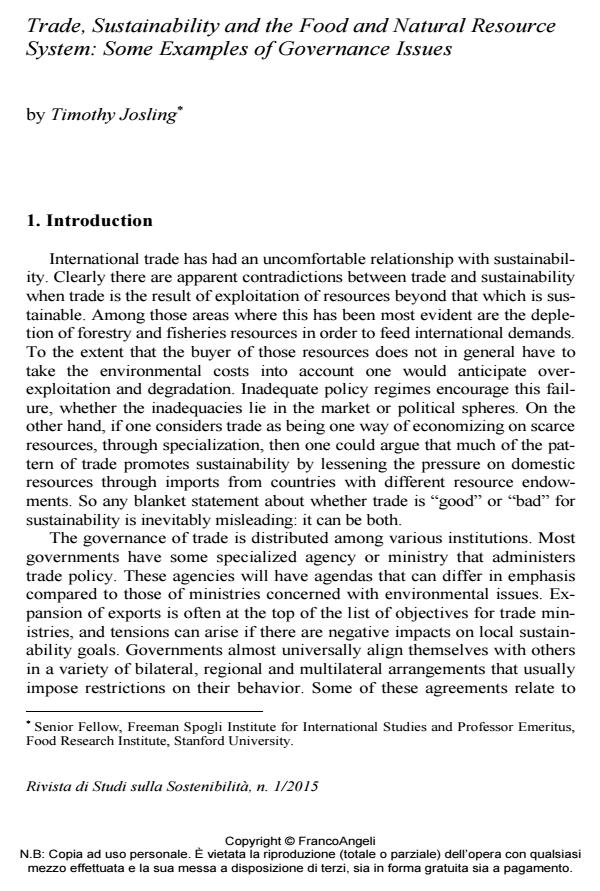Trade, Sustainability and the Food and Natural Resource System: Some Examples of Governance Issues
Titolo Rivista RIVISTA DI STUDI SULLA SOSTENIBILITA'
Autori/Curatori Timothy Josling
Anno di pubblicazione 2015 Fascicolo 2015/1
Lingua Inglese Numero pagine 17 P. 27-43 Dimensione file 207 KB
DOI 10.3280/RISS2015-001003
Il DOI è il codice a barre della proprietà intellettuale: per saperne di più
clicca qui
Qui sotto puoi vedere in anteprima la prima pagina di questo articolo.
Se questo articolo ti interessa, lo puoi acquistare (e scaricare in formato pdf) seguendo le facili indicazioni per acquistare il download credit. Acquista Download Credits per scaricare questo Articolo in formato PDF

FrancoAngeli è membro della Publishers International Linking Association, Inc (PILA), associazione indipendente e non profit per facilitare (attraverso i servizi tecnologici implementati da CrossRef.org) l’accesso degli studiosi ai contenuti digitali nelle pubblicazioni professionali e scientifiche.
Trade in agricultural goods and raw materials provides an important challenge for rule-making at the national, regional and international level. Many of the activities undertaken in the name of efficient agriculture are unsustainable, but unsustainable agriculture does not depend just from the exports level, because it can be found everywhere: in fact, trade in agricultural and food products can both threaten and promote sustainability. At that point the question arises as to what multilateral (or regional) rules are needed specifically to tackle the issue of sustainability and trade? With regards to this question, there are several issues such as property rights to indigenous resources, trade rules governing biofuels, investment in and ownership of land and mineral rights in resource-rich countries. This short paper looks at some specific areas where the issue of global governance, through trade institutions, impinges on farming and fishing practices and related types of raw material trade, by presenting a taxonomy that shows the intersection between government trade activities, trade agreements and sustainability. Particularly, it may consider two categories of government activity in agricultural and raw material trade: taxes or other restrictions and subsidies or other forms of encouragement; these actions can be divided in the direction of sustainability and those that are inimical to that objective. Therefore, the paper will illustrate the interface between trade rules and sustainability objectives, by discussing some examples reflecting these actions/sustainability combinations, such as: the removal of tariffs on environmental goods; restrictions on imports of products produced in an unsustainable way; restrictions on exports of raw materials in the context of scarcity; subsidies to encourage environmental farming practices; subsidies for the production and use of biofuels; and subsidies for fossil fuel usage. The last section links these topics to the issue of gaps in global governance: this item has been recognized in WTO discourse for some time, especially in the Ministerial Declaration on the contribution of the WTO to achieving greater coherence in global economic policymaking. But the search for a cohesive system of governance remains in the hands of the major countries of the world that have to led the way towards the synergy between trade rules and sustainability goals. s.
Il commercio di prodotti agricoli e delle materie prime pone un’importante sfida per la regolamentazione in materia a livello nazionale, regionale e internazionale. Molte delle attività svolte in nome di un’agricoltura efficiente si rivelano insostenibili, ma un’agricoltura non sostenibile non dipende solo dal livello di esportazioni, poiché può ritrovarsi in molteplici situazioni: infatti, il commercio di prodotti agricoli e alimentari può sia minacciare che favorire la sostenibilità. A questo punto, si pone la questione di quali norme multilaterali (o regionali) siano nello specifico necessarie per affrontare il tema della sostenibilità e del commercio. Relativamente a questo interrogativo, si sollevano diverse questioni, quali i diritti di proprietà sulle risorse locali, le regole del commercio in materia di biocarburanti, gli investimenti sui terreni e la loro proprietà e i diritti nei paesi ricchi di risorse naturali. Questa breve saggio esamina alcune aree specifiche in cui la questione della governance globale, attraverso le istituzioni del commercio, incide su agricoltura e pratiche ittiche e le tipologie correlate di commercio di materie prime, presentando una tassonomia che mostra l’intersezione tra le attività commerciali di governo, gli accordi commerciali e la sostenibilità . In particolare, si possono considerare due categorie di attività di governo nel commercio di prodotti agricoli e materie prime: tasse o altre restrizioni, da un lato, e sussidi o altre forme di incoraggiamento, dall’altro; queste azioni possono essere divise a seconda se sostengono la sostenibilità o la ostacolano. Pertanto, il documento mostrerà l’interconnessione tra le norme commerciali e gli obiettivi della sostenibilità, attraverso la discussione di alcuni esempi che riflettono queste combinazioni di azioni/sostenibilità, come ad esempio: la rimozione delle tariffe sui beni ambientali; le restrizioni sulle importazioni di prodotti fabbricati in maniera non sostenibile; le restrizioni all’esportazione di materie prime scarse; i sussidi per incoraggiare pratiche agricole favorevoli all’ambiente; i sussidi per la produzione e l’uso di biocarburanti; e le sovvenzioni per l’uso di combustibili fossili. L’ultima parte del paper collega questi argomenti al problema del vuoto nella governance globale: vuoto che è stato riconosciuto nei discorsi dell’OMC per qualche tempo, soprattutto nella Dichiarazione Ministeriale sul contributo dell’OMC al conseguimento di una maggiore coerenza nella politica economica mondiale. Ma la ricerca di un sistema coerente di governo resta nelle mani dei principali paesi del mondo che devono aprire la strada verso una sinergia tra le regole commerciali e gli obiettivi di sostenibilità.
Parole chiave:Commercio, sostenibilità, risorse, amministrazione, tasse, sussidi.
Timothy Josling, Trade, Sustainability and the Food and Natural Resource System: Some Examples of Governance Issues in "RIVISTA DI STUDI SULLA SOSTENIBILITA'" 1/2015, pp 27-43, DOI: 10.3280/RISS2015-001003